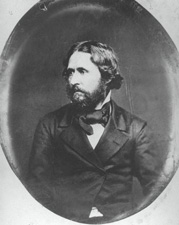John C. Fremont
|
|
John Charles Frémont (January 21, 1813–July 13, 1890), born John Charles Fremon, was an American military officer, explorer, the first candidate of the United States Republican Party for the office of President of the United States, and the first Presidential candidate of a major party to run on a platform of opposition to slavery. He was born in Savannah, Georgia.
Fremonts_men_marker.jpg
Frémont assisted and led multiple surveying expeditions through the western territory of the United States. In 1838 and 1839 he assisted Joseph Nicollet in exploring the lands between the Mississippi and Missouri Rivers. In 1841, with training from Nicollet, he mapped portions of the Des Moines River, and from 1841 to 1846 he led exploration parties on the Oregon Trail and into the Sierra Nevada. During his expeditions in the Sierra Nevada, it is generally acknowledged that Frémont became the first European American to view Lake Tahoe. He is also credited with determining that the Great Basin had no outlet to the sea.
On January 16, 1847 he was appointed Governor of the new California Territory following the Treaty of Cahuenga which ended the Mexican-American War in California. He served (from 1850 to 1851) as one of the first pair of Senators from California. In 1856 the new Republican Party nominated him as their first presidential candidate, but he lost (see U.S. presidential election, 1856) to James Buchanan.
Frémont served as a major general in the American Civil War and declared martial law in Missouri. This declaration led to a conflict with Abraham Lincoln and led to Frémont's removal from command in the West on November 2, 1861. He was re-appointed to a different post (in West Virginia), but lost several battles and resigned his post.
Frémont was appointed Governor of the Arizona Territory from 1878 to 1881. He died of peritonitis in a hotel in New York City.
Four U.S. states named counties in his honor: Colorado, Idaho, Iowa and Wyoming. Several cities are also named after him, such as Fremont, California and Fremont, Nebraska. Fremont Peak in the Wind River Mountains is also named for the explorer.
He collected a number of plants on his expeditions, including the first discovery of the Single-leaf Pinyon. The standard botanical author abbreviation Frém. is applied to plants he described.
References
- Miles Harvey, The Island of Lost Maps: A True Story of Cartographic Crime. New York : Random House, 2000. (ISBN 0375501517, ISBN 0767908260)
| Preceded by: (none) | United States Senators from California 1850 – 1851 | Succeeded by: John B. Weller |
| Preceded by: (none) | Republican Party Presidential candidate 1856 (lost) | Succeeded by: Abraham Lincoln |

